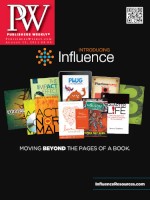After stints as a lawyer and a small publisher, Yfat Reiss Gendell cofounded the Foundry Literary + Media agency. While she represents many types of authors, she has a unique perspective on the health category. Her father, prominent L.A. physician Uzzi Reiss, is the author of numerous health titles, and the two have collaborated on such books as The Natural Superwoman and How to Make a Pregnant Woman Happy. Reiss Gendell now represents some major names in the health arena, including Pierre Dukan, whose The Dukan Diet marks week 16 on PW's list, and Tosca Reno, a bestseller-list veteran with nearly a million copies sold of titles like Your Best Body Now. PW caught up with Reiss Gendell to ask about the market for health books.
You have experience with this category as both an author and as an agent. Can you tell us a little about how you got started writing health titles and what that has been like?
My father is a physician, so the most common dinnertime conversations at our house revolved around current science trends and Lakers basketball. When I was presented with an opportunity to coauthor a health title, I jumped at it, and soon others followed. Because my original training was in a completely different field—law—I always regarded health writing as a passion I enjoyed on the side, like some people ski or play bridge.
The experience of writing with a health professional is intense—imagine a yearlong appointment with a thought leader, where you can ask any question or follow-up. For the time you're collaborating, you get to live in that person's head. It's a real treat.
I have a deal with my business partner, Peter McGuigan: I can't take on writing gigs while we run the agency (not to mention that it would present a conflict for the health coauthors I represent if I were competing with them for this work), but because of this background I take an especially hands-on approach in the development of the health titles I agent.
How have you seen the market for health-related books change over time? What are you hearing from publishers these days?
It used to be that agents could identify a health professional with an interesting approach to a bigcategory problem and could find a publishing home for that clinician's manifesto. Even the modest performers among these books served as terrific backlist staples.
Today, unless the clinician you find spends half of her week on self-promotion, it's almost impossible to find homes for these wonderful health authors. Publishing teams look for authors who marry a unique approach with an existing media platform or at minimum a current "buzzy" magazine article or Internet meme—these must be in place before an agent can bring a book to market.
And as an agent and the steward of your client's publishing experience, you want that for your author, too. How else will your client's book stand out when the rest of the cohort comes armed with TV shows, regular magazine columns, and thousands of social media followers? Or worse yet, if there's a changing of the guard and your author loses her in-house advocate, how will she compete for the attention of her new guardian?
So the same clinician manifestos that once would have found traditional big publishing homes are now more likely to land in the arms of online media, smaller print publishers, and the new crop of digital-only publishers, while mainstream print publishing focuses on titles with some sort of media track record.
One thing we've noticed is the increasing number of titles dealing with nutrition in the health category. How do you see that playing out in the marketplace?
There's a greater scientific awareness that the major disease categories (from a market perspective)—obesity, cancer, heart disease, mental illness, inflammation, and endocrine/diabetes—can be addressed nutritionally. The same for the basket of childhood diseases—allergies, frequent infections, ADHD/autism spectrum disorder and childhood obesity.
Big box retailing has been responding to this trend already: nearly two years ago Wal-Mart debuted an organics program with 500 products, and more recently the retailer announced an initiative focused on buying from local farmers. Our business is simply responding to consumer demand. A logical outgrowth of this will be a backlash against existing health titles that focus on pharmaceutical treatments and new health titles that champion this backlash.



 Volume 258
Issue 33
08/15/2011
Volume 258
Issue 33
08/15/2011





